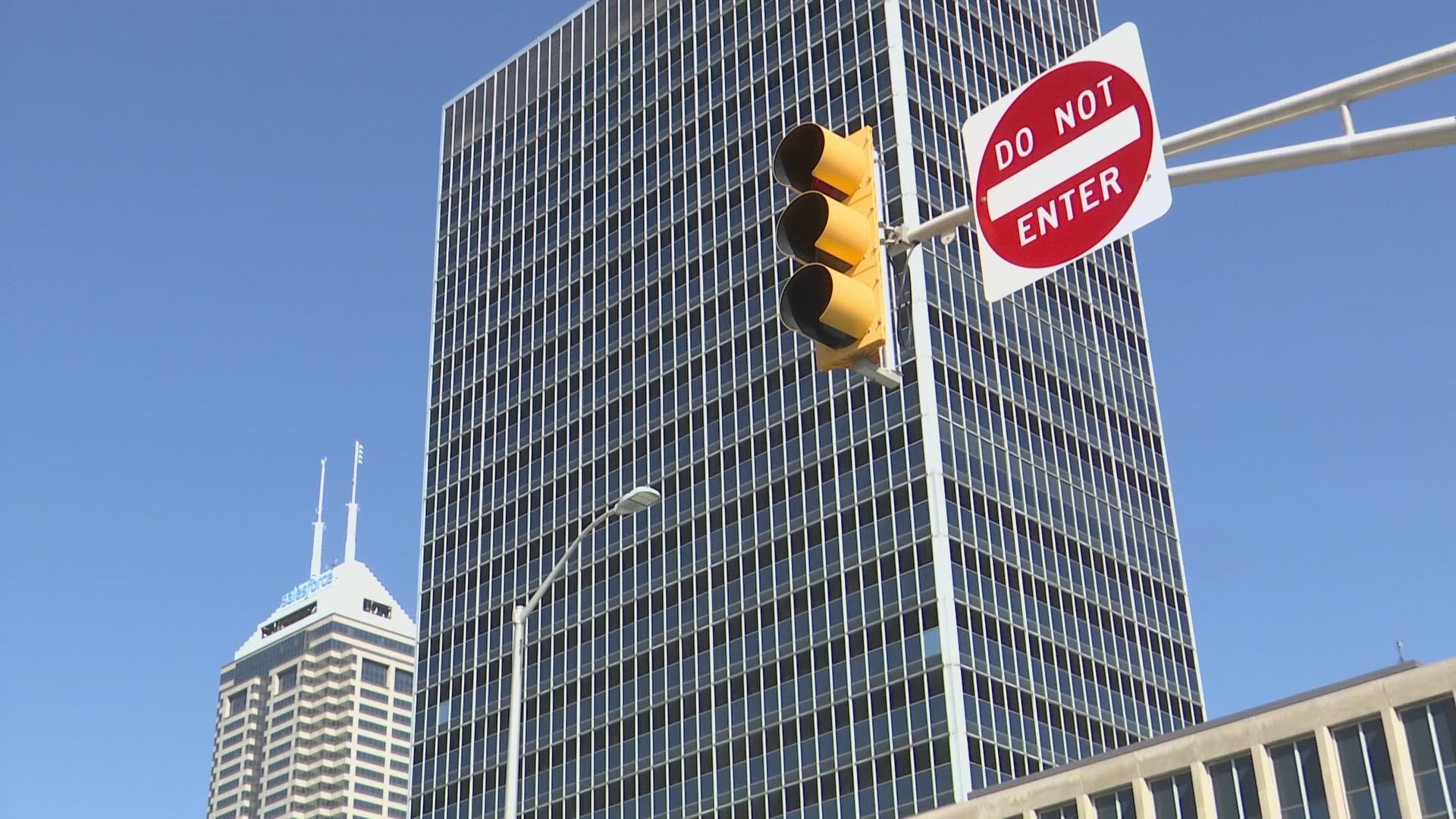INDIANAPOLIS — Indiana lawmakers are returning to the Statehouse in the new year to consider several bills, including proposals that could impact how people in Marion County get around.
The bills could impact public transportation and cars on the roads.
Sen. Aaron Freeman (R-Dist. 32) has filed two bills that deal with both issues. One would affect public transportation and IndyGo's plan to build the Blue Line. The other deals with the no-turn-on-red signs installed in Marion County in this summer.
Both are topics Freeman addressed with proposals in past sessions.
Senate Bill 52 would prohibit public transportation projects, like IndyGo's proposed Blue Line, from using dedicated street lanes for buses only.
The Blue Line would run along East Washington Street and connect the Cumberland area to Indianapolis International Airport.
Currently, Washington Street has two lanes for traffic in each direction with a middle lane for turns. The Blue Line would eliminate one lane in each direction to make way for a dedicated lane only for a rapid transit bus.
Freeman says that will just slow down traffic.
"You're going to take Washington Street, a major thoroughfare through the city of Indianapolis, again from Hendricks County to Hancock County, and take it down to one lane in each direction without a turn lane. I don't need an advanced degree in anything to know that's going to be a traffic nightmare," Freeman said.
Construction on the Blue Line is set to begin in 2025 and finish sometime in 2027. It would be IndyGo's third rapid transit bus line. The Red Line serves downtown Indy from north to south. The Purple Line, which is nearly complete, will connect the east side to Lawrence with dedicated bus lanes.
"I'm all for transit, all for bus service for people that need it, but we should not be taking away lanes of travel in favor of buses over cars," Freeman said.
IndyGo issued a statement about Freeman's proposal, saying dedicated bus lanes are critical to the safety of bus rapid transit and improve bus travel times, while greatly reducing congestion or traffic incidents.
The statement went on to say:
"Without dedicated lanes, the Blue Line does not move forward and would mean the devastating loss of millions of dollars in traffic calming and safety features, along with significant drainage and infrastructure improvements, including sidewalks, street paving, and ADA curb ramps along Washington Street that otherwise would not be realized along a corridor that desperately needs it. It would also mean the waste of more than $185 million spent to build the Purple Line project that was intended to connect downtown Indianapolis to Lawrence through BRT, utilizing dedicated bus lanes.
Since the passage of the referendum in 2016 where 60% of voters approved the Red, Purple and Blue BRT lines, more than $1 billion have been invested along the lines. Nearly $400 million of that is happening specifically along the Blue Line before ground has even been broken in anticipation of the completion of the project.
Many people rely on public transportation, including several schools and essential workers. Ridership continues to increase, especially on the Red Line, and the Purple Line will replace our highest ridership route. Halting the advancement of public transportation will also halt riders' ability to get where they need to go efficiently and safely."
Freeman said he filed another proposed law that, if passed, would see many of Indy's no-turn-on-red signs come down.
This isn't the first time Freeman has proposed a law on the issue. Last session, a bill was passed into law prohibiting Indianapolis from passing an ordinance to put up more no-turn-on-red signs. The law didn't go into effect until July 2023.
A month earlier, the Indianapolis City-County Council passed an ordinance allowing engineers with the city's Department of Public Works to determine which intersections still needed the no-turn-on-red signs. Hundreds went up in August. Freeman calls that unnecessary.
"Why should you not be able to turn on red coming home at 1 a.m., when nobody's walking in the street? " Freeman asked. "All that's going to do is set people up for getting tickets when they get pulled over."
Freeman's proposal would retroactively date the law passed last session that prohibited more such signs in Indy to Jan. 1, 2023.
"During the day, all it's doing is further hindering traffic and not allowing traffic to flow, causing bigger back-ups, causing people to be more frustrated and to violate traffic laws," Freeman said.
If passed, the new signs put up last summer would have to come down.
13News reached out to Indy DPW and the Indianapolis City-County Council for comment. A council spokesperson said they are reviewing the legislation and will monitor it and many other bills during the 2024 legislative session.
The new legislative session begins Jan. 8.

